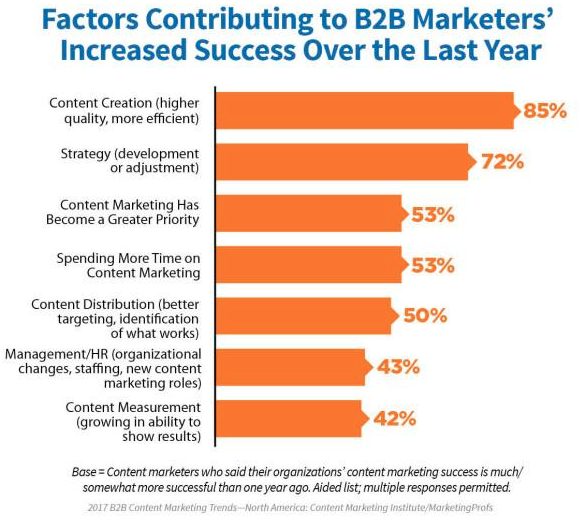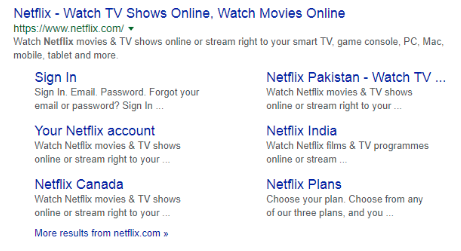Content Marketing Best Practices

Content is, undoubtedly, one of the most influential rudiments of any marketing plan. It doesn’t come as a surprise that around 70 percent of B2B marketers planned to generate more content in 2017 as compared with the previous years.
In fact, around 85 percent of B2B marketers consider better content creation to be the number one factor resulting in augmented success.

In the realm of content marketing, there are various commonly used practices that guarantee marketing success. Whether your brand is B2B or B2C oriented, those strategies can come in handy for you.
In fact, it is often beneficial to comprehend how other companies implement these practices. If you happen to be a veteran content marketer, you can pick up novel ideas from observing diverse tactics – and possibly be stimulated to tweak your own approach. Also, if you are a newbie in the field of content marketing, it is valuable to realize how top brands are leveraging content.
However, first, it is important to understand what content marketing is and why it is such a favored approach among many successful marketers.
What is Content Marketing?
Unlike traditional marketing, content marketing is a premeditated marketing method that focuses on generating and dispensing valuable, pertinent, and reliable content to appeal and preserve a well-defined audience — and, eventually, to stimulate lucrative consumer action.
Rather than pitching their products or services, marketers offer really pertinent and valuable content to their prospective and existing consumers to assist them in addressing their concerns.
Currently, a large number of marketers are making content marketing a part of their long-term marketing policies. It is widely used by numerous conspicuous companies across the globe such as Procter & Gamble, LinkedIn, Microsoft, Cisco Systems, and John Deere. Moreover, it is also established and implemented by small companies all over the world.
Wondering why? Because it works!
Whether you intend to increase sales, curtail costs or improve customer loyalty, content marketing is good for your bottom line. However, before you embark on your content marketing journey, here are a few key best practices that you need to keep in mind.
Related: Building a Strong Content Marketing Plan & Strategy
Topic Research
To come up with an eye-catching blog post or even a podcast, all you need is a good subject and a headline that stimulates the audience to click. Hence, the first step to attracting audience’s attention is to generate a list of content ideas.
Thinking of new-fangled topics for your content marketing drive can be challenging. However, it is not as tough as the majority of the marketers consider it to be. The sure shot recipe for success is to understand your market and the continuing needs of your customers prior to generating relevant content.
It is important to know what topics have been written about repeatedly and which ones are still untouched. This will facilitate you in coming up with topics for your own content marketing practices and ensure that you are producing content that is relevant to your business.
From blog posts and e-books to other long-form content, writing everything commences with the research phase.
Want to take your content marketing to the next level? Here’s how you can always have a reservoir of great topics close at hand:
- Follow various industry blogs to understand what latest industry trends are getting popular
- Subscribe to your competitors’ bulletins to get a better idea of what niche they are ignoring
- Train your consumer care and sales reps to record the queries they receive and utilize those as initial ideas for your content marketing exertions.
- Consider who your consumers and influencers are so you can generate the precise content for each audience.
Related: How to Measure the Success of Your Content Marketing Campaign
Keyword Research
If you wish to locate specific information, you enter particular terms and phrases into a search tool. The search tool such as Google then draws results mostly on the basis of the relevance to that specified query.
Therefore, in order to bear fruitful SEO results, marketers need to recognize what individuals are looking for, how frequently they are looking for it, and why they are looking for it.
So, how can you find all this info? Keyword research is your way to go!
Keyword research is the practice of discovering keyword prospects for your company to achieve a higher rank on search engine lists.
Here’s how to use keyword research for maximizing your SEO efforts:
- Include keywords in your page titles and descriptions. Consider the example of Netflix. ‘Watch TV Shows Online’ and ‘Watch Movies Online’ are their target keywords.

- Also, include keywords within the body content of your webpages wherever they look natural, particularly in your header tags.
- While it is tantalizing to stuff your website with target keywords, too many keywords aren’t going to boost SEO rankings. It’s better to place keywords naturally.
Competitor Analysis
Competitor analysis can facilitate you in identifying the keywords and terms that your direct rivals are already ranking for. Once determined, these keywords can help you choose which ones to fight for and which ones to abandon.
It’s best to go for target keywords that none of your rivals are presently ranking for. Consequently, it will be more convenient to establish rankings; however, it is not always easy to find such keywords.
By means of competitor analysis, you can also recognize the overall development of your rivals’ SEO plans, so you can fine-tune your own strategies to more properly counter them.
Optimization
When it comes to content marketing, content optimization is the key. However, many marketers consider optimization a technical process that is all about SEO and relevant keywords.
In the content-driven realm of digital marketing today, optimizing content is no longer restricted to keyword presence and metadata. In fact, it’s more a matter of conviction, intent, and quality.
Here’s how you can optimize content for your website:
- Use words that build trust, avoid content that is pushy or salesy. Instead, focus on balanced and unbiased content. Most customers claim that they normally trust instructive content from a brand given that it appears unbiased and does not overtly try to sell a product or service.
- Identify the customer’s inquiry, and then create content according to it. After all, customers want what they want, and your content should fulfil his/her needs or the customer will be gone.
- Focus on quality, rather than quantity. Your content should have impeccable grammar, proper choice of words and easy to comprehend.
Competitors Best Practices
‘Keep your friends close, but enemies closer’ holds true here.
If you want your content marketing campaign to stand out, you’d want to take a closer look at your competitors, and recognize the kinds of approaches they are using in their SEO practices.
Here’s why you need to keep track of your competitors:
- For motivation, as learning about how they have improved their webpages and are attracting more relevant consumers to their websites can help you shake up your strategies
- For gauging the level of competition you are in for
- For identifying your weaknesses and opportunities that are still untapped
Related: How to Drive Revenue With Content Marketing
Content Tools to Utilize
Gone are the days when content marketing was a herculean task. With the advent of numerous tools and techniques, it is now easy and hassle-free to implement all the best practices mentioned above. From competitor analysis to content optimization, here are a few tools that can help you with your content marketing endeavors:
- Keywordtool.io: It is a free substitute to Google Keyword Planner and Ubersuggest that utilizes Google’s autocomplete feature to acquire more than 750 long-tail keywords for any specified query.
- Moz: Equipped with a Keyword Explorer, Moz helps you to determine and highlight the best keywords to target. It also identifies competitors that are currently ranking for a specific keyword. Their SEO toolset includes keyword research, link building, site audits, and page optimization insights, all in one.
- SEMRush: SEMRush is a great tool for performing competitor analysis. Once you enter your site domain name, a list of some of your “chief organic competitors” can be seen.
- Search engine result pages (SERPs): A SERP is the page shown by an online search engine based on a keyword query. Search engines such as Google use real-time algorithm which means they are continuously filtering how websites are indexed and classified to match seeker’s intent. Therefore, you need to cultivate a rock-solid content plan, gather a list of targeted keywords, and produce relevant content before starting optimization for SERP.
Final Thoughts
Content marketing is an effective strategy to increase traffic, generate leads, and enable sales along with supporting SEO practices. When implemented correctly, it can contribute to enhancing a website’s search engine rankings.
Irrespective of what tactics you employ for your content marketing campaign, keyword research and topic research are indispensable if you wish to bring together your SEO and content strategy. Keywords are an important aspect of operative SEO, provided that you are investigating and applying them appropriately.
Another important approach is to keep an eye on your competitors and determine what keywords they are targeting and what strategies they have applied to attract more audience. All of this has been greatly simplified through various tools, however, it is important to experiment and determine which set of tools works best in your case.
Our Editorial Standards
Reviewed for Accuracy
Every piece is fact-checked for precision.
Up-to-Date Research
We reflect the latest trends and insights.
Credible References
Backed by trusted industry sources.
Actionable & Insight-Driven
Strategic takeaways for real results.






